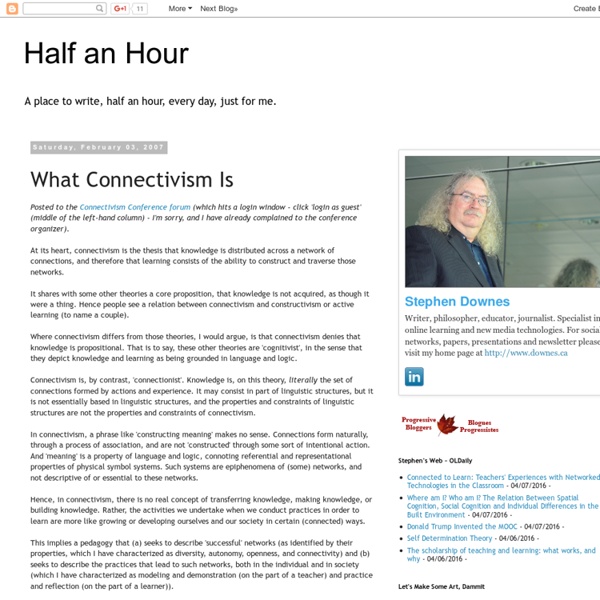About — Connectivism
Description of Connectivism Connectivism is a learning theory for the digital age. Learning has changed over the last several decades. The theories of behaviourism, cognitivism, and constructivism provide an effect view of learning in many environments. The integration of cognition and emotions in meaning-making is important.
Connectivism in Learning Activity Design: Implications for Pedagogically-Based Technology Adoption in African Higher Education Contexts | Kizito
Volume 17, Number 2 February - 2016 Rita Ndagire Kizito Nelson Mandela Metropolitan University, Port Elizabeth, South Africa This paper examines the possible characteristics and the value of designing learning activities grounded in connectivism—an emerging learning theory. Keywords: learning activity design, connectivism, pedagogically-based technology adoption, african higher education contexts For more than two decades, institutions have been searching for ways that could shape pedagogical technology1 adoption in African higher education contexts. The reasons for non-adoption are varied and depend on the teaching contexts. In a study analysing relationships across issues dealing with institutional policy, organisational culture, and e-learning use in four South African universities, Czerniewicz and Brown (2009) cite inadequacy of teaching facilities and lack of staff training as barriers to technology espousal. This paper is an epigrammatic response to these questions. Figure 1. Table 1
Welcome to CCK11 ~ CCK11
2.6 Connectivism | Teaching in a Digital Age
2.6.1 What is connectivism? Another epistemological position, connectivism, has emerged in recent years that is particularly relevant to a digital society. Connectivism is still being refined and developed, and it is currently highly controversial, with many critics. In connectivism it is the collective connections between all the ‘nodes’ in a network that result in new forms of knowledge. According to Siemens (2004), knowledge is created beyond the level of individual human participants, and is constantly shifting and changing. Knowledge in networks is not controlled or created by any formal organization, although organizations can and should ‘plug in’ to this world of constant information flow, and draw meaning from it. The significance of connectivism is that its proponents argue that the Internet changes the essential nature of knowledge. Downes (2007) makes a clear distinction between constructivism and connectivism: Figure 2.6.1: A map of connectivism Image: © pkab.wordpress.com.
Social Theory and Education Research: Understanding Foucault, Habermas ... - Google Books
Although education researchers have drawn on the work of a wide diversity of theorists, a number of these have been of particular significance to education. While the likes of Karl Marx, Antonio Gramsci, John Dewey and Paulo Freire influenced previous generations of educational theorists, much of the more contemporary theory building has revolved around a quartet of well-known and much-debated thinkers – Michel Foucault, Jürgen Habermas, Pierre Bourdieu and Jacques Derrida. However, while the influence of these thinkers has grown considerably over the last number of years, both their original work and its application to education can prove challenging to the educational practitioner. This edited book expertly rectifies this omission in the educational literature, and delivers a text that is both advanced and accessible, offering the education practitioner/researcher a suitable guide to assist their acquisition and application of social theory.
Connectivism as Learning Theory
I think the students in the Building Online Collaborative Environments Course has an almost impossible task. Here is their effort to prove that connectivism is a learning theory. "Connectivism has a direct impact on education and teaching as it works as a learning theory. Though this is not very accurate, in fairness it was an impossible task because of the readings they were assigned (Verhagen’s criticism of connectivism and Siemens’ response to Verhagen) and because the context appears to be the application of learning theories in the classroom. Verhagen's criticism is an early and not particularly well-informed criticism, which Siemens does a reasonable job refuting. What is a Learning Theory So in this post, let me clear, first, about what a theory actually is, and then let me outline the ways in which connectivism can be thought of as a learning theory. To start then: theories explain. A learning theory, therefore, describes what learning is and explains why learning occurs.




Stephen Downes définit le connectivisme, qu'il distingue des théories cognitivistes et constructiviste. En revanche, il affirme la filiation entre la pensée connectiviste et le courant connexioniste. Cet approche fonde la conception des MOOC, il est donc important de s'y référer pour effectuer une recherche à propos de ce système d'apprentissage. by goupil13 Dec 21